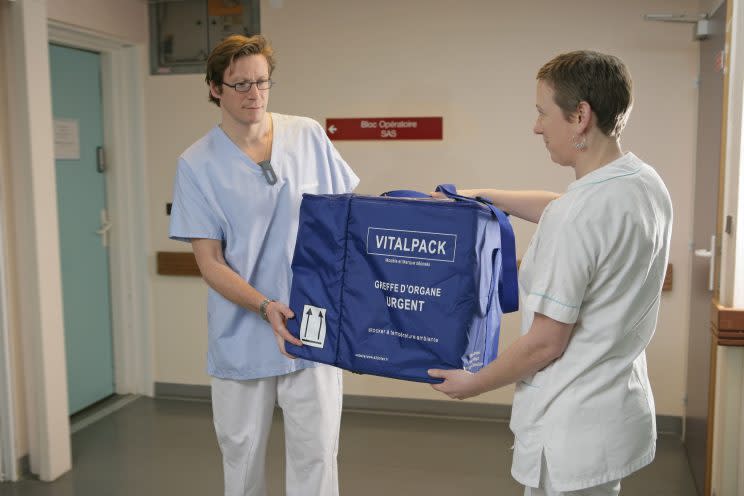Presumed consent in organ donation: pros and cons

Saskatchewan premier Brad Wall has announced he wants to push for “presumed consent” for organ donations in his province — which would make it the first Canadian province to do so if Wall decides on it.
“I think it would be a great thing to lead the country in,” he told the legislature in Regina on Tuesday.
There is one other thing the province “leads” in — it has the lowest organ donation rate in the country. Saskatchewan’s donation rate is less than one per cent compared to the Canadian average of 20 per cent.
Presumed consent would require a person to register to opt-out as opposed to opting in by signing up.
The Canadian Transplant Society favours presumed consent because Canada has one of the lowest organ donation rates in the developed world.
“We hear it all the time: I just didn’t get around to registering,” James Breckenridge, the president of CTS, told Yahoo Canada News.
“They always ask, whenever we are handing out flyers in malls or wherever, ‘How long does it take?’ About three minutes. ‘OK, let’s do it now.’”
Another problem is misinformation. Breckenridge said he often encounters people who say they are afraid doctors will harvest their organs before they are declared dead.
“There is a team of medical professionals who have taken an oath to save your life and then there’s a whole different team of transplant professionals. They are separate,” he added.
Provincial differences
Organ donation consent differs from province to province. Saskatchewan asks its residents to print out a sticker to put on the back of their health card.
“Let’s say someone gets into a really bad car accident and they are unconscious. That sticker is useless, it’s up to the next of kin or person appointed in charge of the victim, to decide what to do.”
Breckenridge said the majority of transplants in Canada is what is called “DBD” — Donor Brain Dead. The person is in a coma and declared brain dead.
“At least one time out of five, the person who is deciding will say no even if the person who is in a coma or dead signed a card. You have to register.”
And that is where the problem lies in Canada. Not every province has a donor registry. B.C., Alberta, Ontario, Quebec, Nova Scotia, Newfoundland & Labrador and P.E.I all have one. What Breckenridge would like to see is an easy and consistent method — i.e. online registration. In some provinces, you have to fill out a form and mail it in.
According to the transplant society, more than 4,000 Canadians await an organ transplant. While 90 per cent of Canadians agree with organ donation, only one in five actually have the intention to officially register.
Breckenridge encourages dialogue about organ donation between family, friends and partners to ensure that everyone is on the same page.
“We want people to take the time to learn more and to ask about it. They can call our hot line 24/7.”
Medical studies argue against
When it comes to presumed consent, the country that is usually trotted out as an example is Spain, which has a 36 per cent donation rate. Breckenridge says that high rate can be attributed to many years of education about organ donation and the placement of physician donor coordinators in every hospital.
A British study, published in 2011, discovered that only when donation coordinators in Spain spent time getting to know a family from early on and spending at least three to four hours with them, did the rate of donation jump. Its findings are similar to that of a study done by Johns Hopkins University School of Medicine in the U.S.
“Spain has a presumed consent statute but it doesn’t impose it,” Dr. Simon Bramhall, a liver surgeon who authored the 2011 study, told Yahoo Canada News.
“The Spanish model [of using organ donation coordinators in every hospital] works but it is very expensive and it takes a long time, I think about 20 years before they saw a boost in numbers,” said Bramhall.
Spain uses doctors to be coordinators while other countries tend to use nurses. Bramhall insisted that there is no difference between using a doctor versus a nurse.
The British surgeon noted that Iran has followed the Spanish model as well and has seen its donation rates increase.
“Last year, Wales decided to implement it and we are awaiting the results,” said Bramhall. “I doubt if the numbers have changed.”
Bramhall said his report concluded that Britain should explore all other steps prior to adopting presumed consent. The donation rate for the U.K. is about the same as Canada.
“I think all western countries should be able to hit a 25 per cent organ donation rate,” he said. “Getting to Spain’s number would also be nice, too, of course.”
In Canada, Breckenridge hopes that more resources will be poured into educating the public and for Saskatchewan to up its game.
Premier Wall is now perusing the recommendations of a standing committee which examined organ donation. It did not recommended presumed consent but strongly advised having a registry.
That alone would satisfy Breckenridge, at this point in time. One donor can benefit more than 75 people and save up to 8 lives, according to the CTS.
“You could change so many lives if you just established an online registry,” Breckenridge said. “One person’s organ donation can affect so many lives. Just do that. Please.”



